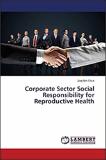| dc.contributor.author | Osur, Joachim | |
| dc.date.accessioned | 2022-05-10T11:38:57Z | |
| dc.date.available | 2022-05-10T11:38:57Z | |
| dc.date.issued | 2015-10-13 | |
| dc.identifier.isbn | -10 : 365979144X | |
| dc.identifier.isbn | 13: 978-3659791444 | |
| dc.identifier.uri | https://repository.amref.ac.ke/handle/123456789/692 | |
| dc.description | Available at Amazon Books | en_US |
| dc.description.abstract | There is great benefit when public, corporate and civil society sectors work together to improve wellbeing of communities. This ideal is however fraught with myriads of challenges including suspicion and poor knowledge of one sector against another. The height of this may be well represented by the way the corporate sector views reproductive health NGOs. This book presents a case study of Family Health Options Kenya, an affiliate of the International Planned Parenthood Federation and how it is understood and viewed by corporations in Kenya. It goes ahead to interrogate the possibility of the corporations supporting the organization through corporate social responsibility. Important lessons on how reproductive health organizations can improve their marketability to the corporate world and benefit from stronger collaboration and support are presented. These lessons can be applied by similar NGOs to improve sustainability and benefit millions of poor people across the world served by the NGOs. | en_US |
| dc.language.iso | en | en_US |
| dc.publisher | LAP LAMBERT Academic Publishing | en_US |
| dc.subject | Civil society | en_US |
| dc.subject | Knowledge | en_US |
| dc.subject | Family Health Options Kenya | en_US |
| dc.subject | International Planned Parenthood Federation | en_US |
| dc.subject | NGOs | en_US |
| dc.title | Corporate Sector Social Responsibility for Reproductive Health | en_US |
| dc.type | Book | en_US |

